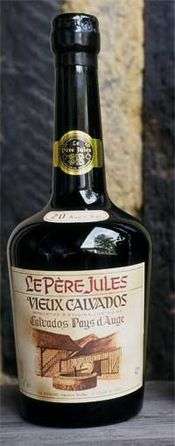Fruit brandy
Fruit brandy is a distilled beverage produced from mash, juice, wine or residues of culinary fruits. The term covers a broad class of spirits produced across the world, and typically excludes beverages made from grapes, which are referred to as plain brandy (when made from distillation from wine) or pomace brandy (when made directly from grape pomace). Apples, peaches, apricots, plums and blackberries are the most commonly used fruits.
Description
According to a legal definition in the United States, a "fruit brandy" is distilled "solely from the fermented juice or mash of whole, sound, ripe fruit, or from standard grape, citrus, or other fruit wine, with or without the addition of not more than 20 percent by weight of the pomace of such juice or wine, or 30 percent by volume of the lees of such wine, or both."[1][2]
In British usage, "fruit brandy" may also refer to liqueurs obtained by maceration of whole fruits, juice or flavoring in a distilled beverage, for example cherry brandy. Such beverages are used as desserts and as an ingredient in cocktails and cakes. Fruit brandies obtained by distillation are referred by the French term eau de vie.[3]
Fruit brandy usually contains 40% to 45% ABV (80 to 90 US proof). It is often colourless. Fruit brandy is customarily drunk chilled or over ice, but is occasionally mixed.
List of fruit brandies

- Applejack is an American apple brandy made from the distillation of hard cider. It was once made by fractional freezing which would disqualify it as a proper brandy.
- Brinjevec is a Slovenian brandy distilled from ground and fermented juniper berries.
- Buchu brandy is South African and flavoured with extracts from Agathosma species.
- Calvados is an apple brandy from the French region of Lower Normandy.[4] It is double distilled from fermented apples.
- Coconut brandy is actually made from the sap of borassus flowers.
- Damassine brandy is made with the prune fruit of the Damassinier tree in the Jura Mountains of Switzerland
- Eau de vie is a French term for colorless fruit brandy. This term is also applied to grape-based brandy other than armagnac and cognac.
- Obstler is a German word for fruit brandy and often referred to as Schnapps in English.
- Kirschwasser is a fruit brandy made from cherries.[4]
- Kukumakranka brandy is South African and flavoured with the ripe fruit of the Kukumakranka.
- Pálenka or "Pálené" is a common traditional description for Slovak brandy. It must be distilled from Slovakian wild or domestic fruits.
- Pálinka is a traditional Hungarian fruit brandy.[4] It can only be made with fruits from Hungary, such as plums, apricots, peaches, elderberries, pears, apples or cherries.
- Poire Williams is made from the Williams pear, also known as the Bartlett pear.
- Rakia is a type of fruit brandy produced in Albania, Bosnia, Bulgaria, Croatia, Macedonia, Montenegro and Serbia: it may be made from plums, apples, quinces, pears, apricots, cherries, mulberries, grapes, or walnuts.
- Slivovitz is a strong fruit brandy made from plums. It is produced in Croatia, Bulgaria, Macedonia, Slovenia, Bosnia and Herzegovina, Serbia, Slovakia, the Czech Republic, and Poland.
- Țuică, also known as horincă or turţ, is a clear Romanian plum brandy. Other Romanian fruit brandies, often distilled from apples, pears, apricots, mulberries, peaches, quinces, or mixtures of these, are colloquially known as rachiu.[5]
- Somerset Cider Brandy which dates back to 1678 obtained European protected status in 2011.[6]
References
| Wikimedia Commons has media related to Obstler. |
- ↑ "Standards of Identity for Distilled Spirits, Title 27 Code of Federal Regulations, Pt. 5.22" (PDF). Retrieved 22 July 2014.
- ↑ Y. H. Hui, E. Özgül Evranuz, ed. (2012). Handbook of Plant-Based Fermented Food and Beverage Technology, Second Edition. CRC Press. ISBN 9781439849040.
- ↑ "Fruit brandy recipes". BBC. Retrieved 22 July 2014.
- 1 2 3 "Brandy". Encyclopedia Britannica.
- ↑ "ORDIN nr. 368 din 13 iunie 2008 pentru aprobarea Normelor privind definirea, descrierea, prezentarea şi etichetarea băuturilor tradiţionale româneşti" (PDF) (in Romanian). Ministerul Agriculturii si Dezvoltarii Rurale. Retrieved 2012-05-26.
- ↑ "Victory for Somerset as cider brandy wins protected status". The Guardian. 15 September 2011.